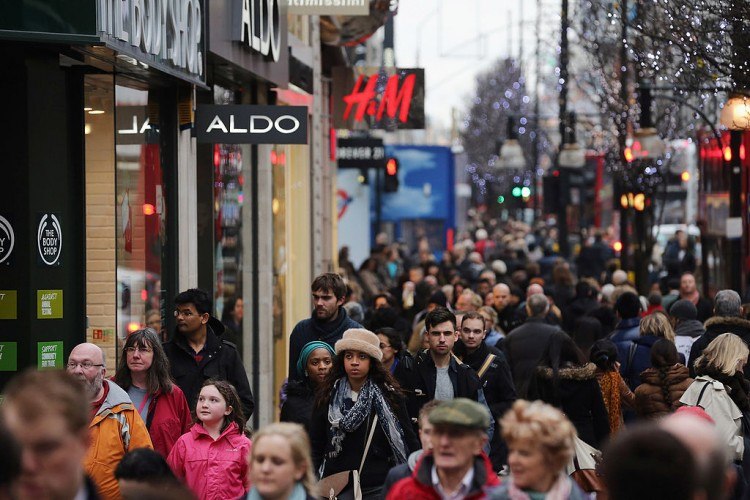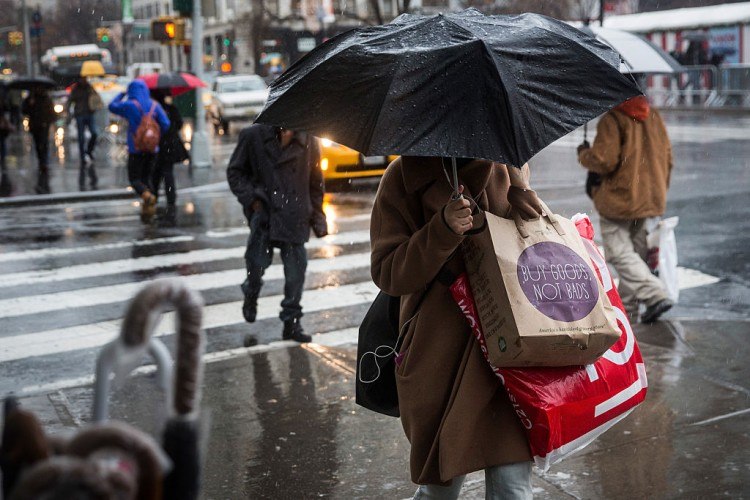
It’s clear that we are a nation of consumers. We buy the necessities, we buy the luxuries, and we buy everything in between. But we’re also a nation of incredibly busy people. Most of us work over 40 hours each week to support ourselves and our families, to put food on the table, and a roof over our heads and clothes on our backs. How do we try to reconcile our wants and needs to buy things with our increasingly busy schedules? The solution for many Americans is unfortunate but easy: we shop on the weekends.
At first, it may seem like a no-brainer: if we don’t have to work on Saturdays and Sundays, then those are perfect days for us to go to the grocery store, to the mall, to the department stores and discount stores and more to get the things we need to survive and to enrich our lives. However, shopping on the weekends is, in many ways, a big mistake. Need some more convincing?
Here are 20 reasons to never shop on weekends…

1. Stores are most crowded on Saturdays and Sundays.
Again, most Americans have the weekends off from work, and they’re trying to take care of their families’ needs on those two days away from the office. They’re all shopping on Saturdays and Sundays, which makes stores — all stores — insanely crowded. Even if you’re an extrovert, trying to fight the throngs for food, clothing, furniture, or whatever is simply exhausting.

2. Checkout lines are longer on the weekends.
It just stands to reason that if stores are more crowded on the weekends, then so are the checkout lines. This means that if you shop on a Saturday or a Sunday, you’ll spend more time standing around in line, just waiting to buy whatever is in your hand or your cart, instead of doing something more productive. And of course, standing around like that puts a lot of stress on your legs, feet, and back; there’s a physical toll as well as an emotional toll here.

3. As a result, you’ll feel more negative about shopping — and weekends.
It’s not that shopping should be fun all the time, but it shouldn’t be an activity you thoroughly dread either. But if you’re shopping only on the weekends, you’ll run into substantially more frustrations than if you shop Monday through Friday. Soon enough, you’ll develop negative feelings about the things you feel you have to do on the weekend, during time that’s supposed to be yours.

4. You’re apt to spend more money if you shop on the weekends.
Crowds, long lines, feelings of negativity — these are all problems. When we’re out shopping, how do many people solve problems? They throw money at them and hope they’ll stop. We buy more because we don’t want to subject ourselves to the same difficult experience next weekend. We’re less attentive to ways we can save money on our purchases. We don’t want to haggle with an employee when he or she rings an item up at too high a price. We just want to pay our total and get out.

5. You’re more likely to spend money on unnecessary and unhealthy snacks.
It’s not that shopping is an endurance sport, but dealing with all the frustrations of weekend shopping can leave you, as the kids are so fond of saying, hangry. (That’s hungry and angry.) And when that feeling creeps in, the only thing that satisfies it is some comforting junk food. So we take a shopping break for frozen lattes and milkshakes and soft pretzels the size of steering wheels — all sorts of foods that are cheap and taste good but are ultimately high in calories and low in nutrition. They make you heavier and your wallet lighter, and you’re less likely to buy them if you shop during the week.

6. Store inventory is often lower on the weekends.
With more people heading to the stores on Saturdays and Sundays, stocks get depleted much faster than they do during the week. What’s more, they don’t get replenished as quickly, either because there aren’t enough employees to keep up with crowds or because they’ve simply run out of items. What’s more, restocking hardly ever happens on the weekends, which means you usually have to come back during the week to get what you want. If you just make it a rule to shop during the week instead of the weekend, you avoid this whole issue.

7. Employees are often in a bad mood on the weekends.
All of the hustle and bustle, the questions and demands, and the impatient customers can really take a toll on the demeanor of the employees who have to work on Saturdays and Sundays. They are, you know, only human — we all are. When you shop on the weekends, you deal with store employees who are just in a bad mood. Shop during the week, and you’ll probably have much more pleasant encounters.

8. It forces stores to hire more people to work weekends.
You’ve got the weekends off, and it’s pretty nice, isn’t it? Wouldn’t it be great if everyone had the weekends off? Of course that’s an idealistic and unreasonable scenario, but we can do our part to give more people the opportunity to enjoy the weekend by not shopping on the weekends. It’s supply and demand: if we’re in stores on weekends, then stores need to hire more employees to work weekends.

9. You often miss mid-week sales and discounts.
Store managers don’t have much incentive to mark down merchandise on Saturdays and Sundays if they know that customers are going to be shopping no matter what their prices are set at. However, stores will often mark down prices and run one-day sales during the middle of the week when business is slower to lure customers in. If you only shop on the weekends, you may be paying more for a lot of things; shop during the week, and you can often take advantage of lower prices.

10. Some states have blue laws, essentially cutting your shopping time in half.
Although it may seem like an archaic notion to many consumers, in some parts of the country, sales of certain types of goods are prohibited on Sundays. That means if you’re car shopping, furniture shopping, or looking for many household items, your weekend shopping time — and everyone’s weekend shopping time — is limited to Saturdays. All of the issues discussed on this list so far are then compounded: stores are even more crowded, lines are even longer, and employees are even less friendly when there’s only one weekend day to shop. Additionally, if you want to buy a bottle of wine or a case of beer, you’ll never have any trouble doing so during the week, but some regions prohibit sales of alcohol on Sundays.

11. Negotiating a deal is harder on the weekends.
If you’re in the market to buy something with a negotiable price, you’re less likely to get the best price on the weekends. Lots of other customers means lots of potential for vendors to get the asking price for their goods, and these vendors will probably be less likely to play ball with you. Shop on the weekdays, when business is slower and vendors are more eager to make a sale, and your haggling will likely get you further.

12. Food at grocery stores is freshest during the week.
While some mega-marts do get fresh food deliveries all seven days of the week, most grocery stores don’t get deliveries on the weekends. If you’re shopping for fresh items like meat, dairy, and produce on the weekends, they’ve probably been off the truck for at least 24 hours (and probably closer to 48). If you’re after the freshest foods, you’ll want to shop during the week. The one exception to this is weekend farmers markets, where the food is always fresh.

13. Grocery shopping on the weekends means planning for the whole week.
If you buy food for your family on the weekends, you’re meal planning for as many as six days out. Not only does that take a lot of time and energy, but it doesn’t take into account that your plans might change, and that you might veer from your original meal ideas when you have to work late or simply don’t feel like cooking one night. As a result, you may find that you throw out ingredients without ever actually cooking them, simply because they’ve spoiled before you could get to using them. By doing smaller weekday shopping trips to the store, you buy what you know you need for the next day or two without having to anticipate big schedule changes.

14. Car shopping on the weekends means crowded dealerships and higher prices.
Because so many people shop for a new car on the weekends, dealerships know that they’re going to make at least a few sales. Therefore, they’re less likely to haggle with you and give you the price you want. However, if you go early in the week, you’re more likely to get a better price. This is especially the case if the dealership had a lackluster sales weekend; they’ll be desperate to sell some cars and will be more willing to work with you.

15. Gas prices almost always spike on the weekends.
Unless you drive an electric car, walk or ride your bike everywhere, or rely on public transportation, you’ve got to fill your tank if you want to get anywhere. But Saturdays and Sundays (and even after late morning on Fridays) are probably the worst days to fill up. Gas prices almost always spike before the weekend rush, and you’ll end up paying more. This is especially true before big holiday weekends like Memorial Day, Fourth of July, and Labor Day. If you want the best price on gas, you’re almost always better off filing up on Tuesday, Wednesday, or Thursday.

16. Prices of airline tickets are almost always highest on weekends.
The market for plane tickets is ever fluctuating and highly volatile. Frequent fliers know that airlines bring their prices up on weekends, then drop them early in the week after the weekend rush. To avoid paying top dollar for your next flight, buy your ticket on Tuesday, Wednesday, or Thursday. You can often save 20% with this tip, and sometimes you can save as much as 50%.

17. When you shop on the weekends, you never fully relax.
After you’ve spent all week at work, shopping on the weekend can feel like another task. When you have to go back to work on Monday morning after spending all weekend shopping for your family’s needs, it can often feel like you never really got a chance to relax on your days off. Shopping during the week allows you to use your weekends to fully recharge your batteries for the week ahead.

18. Weekends are personal time and family time.
How’s your mental well being? What are your kids up to? How are the members of your family holding up? If you’re spending your weekends shopping, you may never find out. Weekends are for pursuing creative pursuits, for indulging in hobbies and going on adventures and making memories with the ones you love. Leave the shopping for the week, and take your Saturdays and Sundays for yourself and your family.

19. Shop the 5/7, not the 2/7.
Blue law states aside, most stores are open seven days a week. Some are even open 24 hours a day! When you’ve got all that time to take care of your shopping needs, don’t choose the same two days as just about everyone else to dive into the consumerism pool. Save your shopping for the week — you’ve got plenty of time.

20. Short shopping trips during the week mean you’ll probably spend less.
If you cut out shopping on the weekends, you’re probably left with a limited amount of time to shop during the week. This means you’re spending less time opening your wallet, which means there’s less time for the cash to fly out. If you’re on a tight budget, eliminating your shopping on two of the seven days of the week can help you out tremendously.

Comments
Loading…